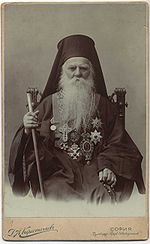- Nathanael Ohridski
-
Nathanael of Ohrid , Nathanael of Plovdiv or Nathanael Zografski, born Nesho Stanov Boykikev; (Bulgarian/Macedonian: Натанаил Охридски) (26 October 1820, Kučevište, Ottoman Empire – 18 September 1906, Plovdiv, Bulgaria) was a Bulgarian[1][2] cleric, writer and revolutionary from Macedonia, one of the first supporters of literature in modern Bulgarian (as opposed to Church Slavonic) and one of the early figures of the Bulgarian National Revival. Nathanael is considered ethnic Macedonian in the Republic of Macedonia.
Contents
Biography
Nathanael was born as Nesho (Nedyalko) Stoianov Stankov Boykikev or village of Kučevište, near Skopje, then Ottoman Empire. He studied at Kučevište monastery, and in 1835 went to study in Samokov. Then continued his education in Prilep, where along with teacher George Samurkashev translate in Bulgarian language the treatise "The Service of Jews and their evil", published in 1839 by Teodosiy Sinaitski.
In 1837 Boykikev become a monk in Zograf Monastery, named Nathanael. One year later he went to Chişinău, to study in the local theological school. He continued his education in the Theological Seminary in Odessa, Russia. In 1840-1841 he took part in translating of "Christian Mirror", printed in Moscow in 1847. He graduated Theological Academy in Kiev in 1851 with thesis on the medieval Bulgarian Orthodox church history.
Nathanael published the book "A friendly letter by Bulgarian to Greek" in 1853 (Prague, Church Slavonic language).He was a ministry of Dobrovets monastery in Moldova in 1854-1869. In 1863 along with Ivan Seliminski arhimandrit Nathanael was a Bulgarian delegate in Moravia in the celebration of 1000 years of work of Saints Cyril and Methodius. Nathanael published in 1865 "Slav-Bulgarian primer" (Bucharest) and "Incident in Skopje Eparchy" (Brăila), which describes antigreek clerical and cultural movement of the Bulgarians in Northern Macedonia.
Nathanael was Bulgarian bishop in Ohrid in 1874-1880. He was also one of the leaders in the Kresna-Razlog Uprising. Nathanael was bishop of Lovech from 1880 to 1891, and from 1891 until his death was bishop of Plovdiv.
Nathanael Ohridski was a full member of the Bulgarian Learned Society (Bulgarian Academy of Sciences).
Enternal links
Notes
- ^ A letter from Nathanail, Bishop of Ohrid, to I. S. Aksakov on the need to preserve the Bulgarian people's national integrity.July 24th, 1878 [1]
- ^ A letter of bishop Nathanail to Petko Voyvoda about the organization of the struggle of the Bulgarians who have remained under Turkish domination September 25th, 1878
Sources
- Енциклопедия "Българската възрожденска интелигенция. Учители, свещеници, монаси, висши духовници, художници, лекари, аптекари, писатели, издатели, книжари, търговци, военни..."(Съставители: проф. д-р Николай Генчев, Красимира Даскалова), С. 1988, с. 446-447
- Натанаил Охридски - Борба за България, ISBN 954071432X Веска Топалова, Издател:УИ "Св. Климент Охридски", 2003.[2]
See also
Categories:- 1820 births
- 1906 deaths
- People from Čučer-Sandevo
- 19th-century Christian clergy
- Bulgarian writers
- Bulgarian revolutionaries
- Bulgarian clergy
Wikimedia Foundation. 2010.

